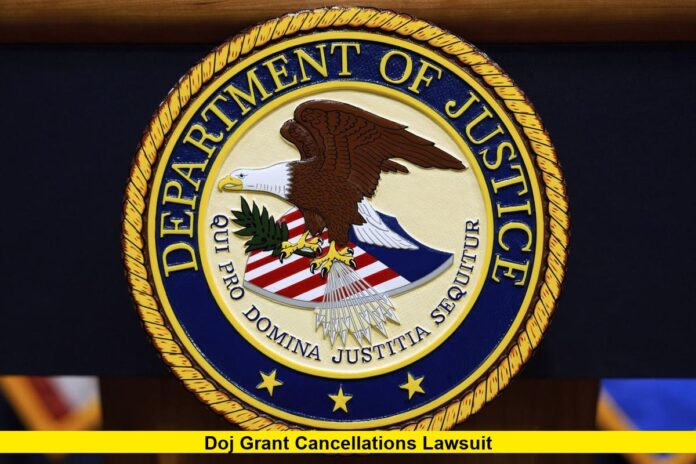A federal judge has dismissed a major lawsuit challenging the Trump administration’s decision to cancel nearly $800 million in Department of Justice grants for violence reduction and crime victim programs. U.S. District Judge Amit Mehta in Washington on Monday denied a preliminary injunction sought by five organizations attempting to halt the massive DOJ grant cancellations lawsuit proceedings.
The ruling represents a significant victory for the Trump administration’s efforts to redirect federal funding priorities, while delivering a major blow to organizations that depend on these grants for critical community safety programs. The preliminary injunction was sought by five organizations to stop the Trump administration from rescinding nearly $800 million in grants for programs supporting violence reduction and crime victims.
Legal Challenge Against DOJ Grant Cancellations Lawsuit Fails
The dismissed lawsuit targeted the administration’s decision to terminate more than 360 grants across various violence prevention and victim support programs. Five organizations filed on behalf of all recipients of the more than 360 grant programs that faced immediate cancellation under the new administration’s policy changes.
Judge Mehta’s decision effectively clears the path for the administration to proceed with its controversial funding cuts, which have sparked widespread concern among law enforcement agencies, victim advocacy groups, and community organizations nationwide. The DOJ grant cancellations lawsuit represented one of the most significant legal challenges to the administration’s domestic policy overhaul.
Key Points Summary:
- Federal judge dismisses lawsuit seeking to block $800 million in DOJ grant cancellations
- Five organizations filed suit on behalf of 360+ grant recipients
- Trump administration successfully defends funding cuts in court
- Programs supporting violence reduction and crime victims affected
Trump Administration Defends Funding Cuts in Court
The Justice Department asked Mehta to dismiss the suit, arguing in a court filing that there was “no legal basis for the Court to order DOJ to restore lawfully terminated grants and keep paying for programs that the Executive Branch views as inconsistent with the interests of the United States”. The administration’s legal team characterized the challenge as a routine contract dispute rather than a constitutional issue.
The government’s defense strategy focused on executive branch authority to redirect federal spending based on policy priorities. Noting that it intended to redirect the grant funds, it called the suit a “run-of-the mill contract dispute” and said it belonged in a different court. This approach successfully convinced Judge Mehta that the plaintiffs lacked sufficient legal grounds for emergency relief.
Impact on Violence Prevention and Victim Services Programs
The dismissed DOJ grant cancellations lawsuit affects hundreds of programs nationwide that provide essential services to crime victims and communities at risk. These grants typically fund initiatives ranging from domestic violence shelters to community policing programs and victim compensation services.
Organizations that relied on these grants now face immediate operational challenges, with many programs potentially shutting down or significantly reducing services. The cancellations represent one of the largest single cuts to federal criminal justice funding in recent years, affecting both urban and rural communities across the country.
Broader Context of Federal Grant Restructuring
The DOJ grant cancellations lawsuit emerges within a broader pattern of federal funding restructuring under the current administration. While DOJ officials have suggested that further funding cuts may be on the horizon, the Administration has also shown a willingness to reinstate specific grants as they have learned of the implications.
Recent weeks have seen similar funding cuts affecting other institutions, including the immediate cancelation of approximately $400 million in federal funding to Columbia University due to the school’s continued inaction in the face of persistent harassment of Jewish students. These actions demonstrate the administration’s willingness to use federal funding as a policy enforcement tool.
Legal Precedent and Future Implications
Judge Mehta’s ruling in the DOJ grant cancellations lawsuit establishes important precedent regarding executive branch authority over federal grant programs. The decision suggests that courts will be reluctant to intervene in funding decisions characterized as policy choices rather than violations of specific legal obligations.
This ruling may encourage similar challenges to federal funding decisions while simultaneously strengthening the administration’s legal position for future grant modifications. Legal experts suggest that affected organizations may need to pursue alternative legal strategies, including individual contract disputes or constitutional challenges based on specific statutory violations.
What’s Next for Affected Organizations
Organizations affected by the DOJ grant cancellations lawsuit dismissal face immediate decisions about program continuation and alternative funding sources. Many are exploring state and local funding options, private foundation grants, and emergency fundraising campaigns to maintain essential services.
The administration has indicated openness to reinstating some grants based on program alignment with current policy priorities. However, the criteria for such reinstatement remain unclear, leaving many organizations in operational uncertainty.
The dismissed lawsuit represents a critical moment for federal-state relationships in criminal justice funding, with potential long-term implications for how federal grants are administered and challenged in court. Organizations continue to monitor developments while adapting to the new funding landscape.
Stay informed about ongoing developments in federal grant policies and their impact on community safety programs by following official DOJ announcements and legal proceedings.
